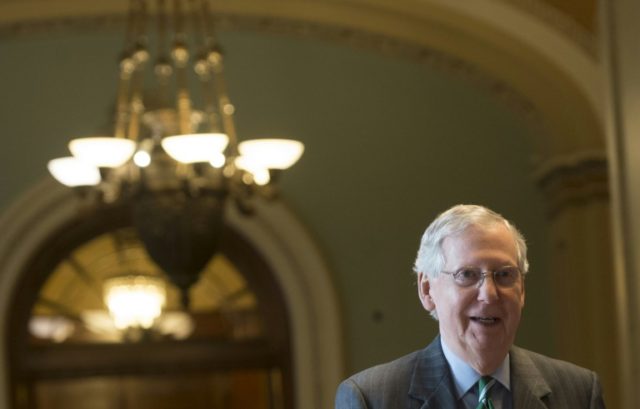Washington (AFP) – US Senate Republicans on Monday launched into a crucial week seeking to ram through the most consequential legislation of Donald Trump’s presidency to date, but his party’s support for the health care bill has slackened and its passage is in doubt.
With Democrats uniting in opposition, Republican leaders have struggled to rally enough backing from within their ranks to get the bill over the line, something Senate Majority Leader Mitch McConnell has said he wants to accomplish by Friday even as some in the party resist the short timeline.
Five Republicans have publicly opposed the bill as drafted. Several more have expressed concerns, particularly the way it slashes the expansion of Medicaid, America’s public health program for the poor and disabled.
Thirty-one states have expanded Medicaid to make eligible people who are at or below 138 percent of the poverty level.
Last week, Senate leaders unveiled an overhauled health care plan aimed at fulfilling Trump’s pledge to repeal the Affordable Care Act, or Obamacare, the landmark reform of his Democratic predecessor Barack Obama.
It was billed as a revamped version of the legislation that passed the House of Representatives earlier this month, but critics say it follows a similar outline with only modest changes.
Despite potential roadblocks in the Senate, Trump said Monday that Republicans were working overtime to secure the necessary votes from within.
“Republican Senators are working very hard to get there, with no help from the Democrats. Not easy!” Trump tweeted.
But he also repeated his suggestion that Congress “just let OCare crash & burn.”
In a Fox interview broadcast Sunday, Trump had expressed confidence the Senate would pass its bill despite “obstruction” from Democrats.
“We don’t have too much of a choice, because the alternative is the dead carcass of Obamacare,” he said.
The bill would create a new system of federal tax credits to assist people buying health insurance, while allowing states the ability to drop many benefits required under the ACA, such as maternity care and emergency services.
With Republicans enjoying a 52-48 majority in the Senate, McConnell can only afford to lose two defectors. In the event of a 50-50 tie, Vice President Mike Pence, as president of the Senate, would cast the deciding vote.
– ‘Insufficient and unworkable’ –
But misgivings about the measure have grown, particularly in states that expanded Medicaid. Senator Bill Cassidy, a Republican from Louisiana, said he is undecided about the bill.
Voices of concern were heard outside Congress too. At least three Republican governors — in Arizona, Nevada and Ohio — are either opposed to the bill or want substantial changes made.
The bill drew criticism for its cap of overall federal spending on Medicaid, and its allotment of money to states on a per-beneficiary basis.
“The per capita cap growth rates for Medicaid in the Senate bill are insufficient and unworkable,” the bipartisan National Association of Medicaid Directors said in a statement Monday.
Several Republicans have spoken out about the secrecy of the Senate bill, which was crafted behind closed doors by McConnell and a handful of aides.
Others have warned that the timeline is too aggressive, given the magnitude of the legislation.
“There’s no way we should be voting on this next week,” Republican Senator Ron Johnson warned on NBC’s “Meet the Press” Sunday.
“I have a hard time believing Wisconsin constituents or even myself will have enough time to properly evaluate this.”
The bill that will go up for debate as early as Monday evening faces the tough task of wooing enough Republican moderates and conservatives to win majority approval.
In an op-ed in Monday’s New York Times, Johnson fleshed out his concerns with the measure, which he said “doesn’t appear to come close to addressing (the) plight” of millions of working men and women.
He said the bill, like Obamacare, relies too heavily on government spending and “ignores the role that the private sector can and should play” in the insurance markets.

COMMENTS
Please let us know if you're having issues with commenting.